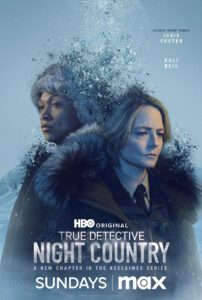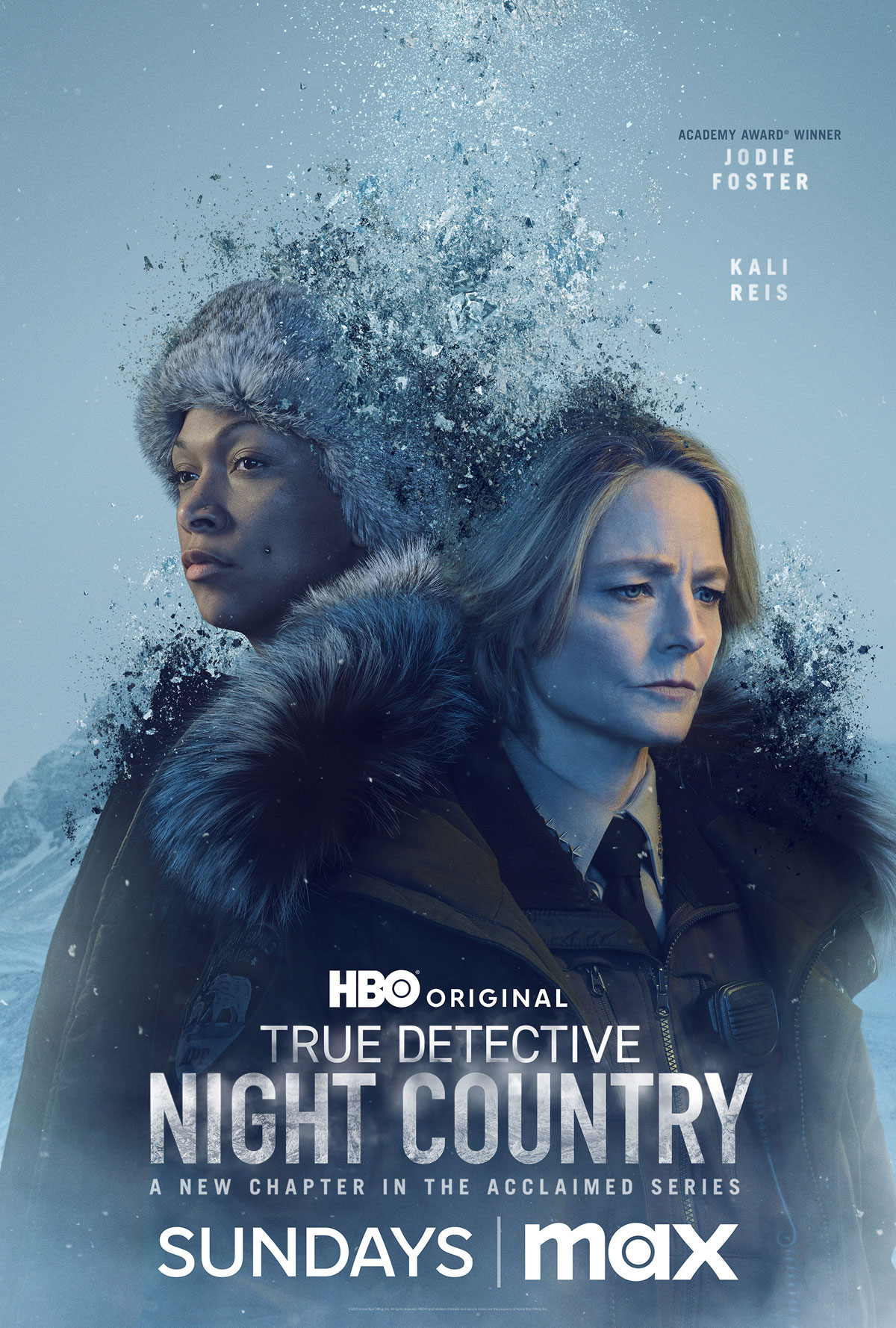
Supernatural
Network: HBO
Creator: Issa López
Season Year: 2024
Watch: Max
I’m not really certain what the vision was for the True Detective universe when it started back in 2014. But I’m pretty sure this wasn’t it. Because, truth be told, there is very little detecting done in this series. Or at least very little done by the two people we’d expect to be doing the detecting. There’s stumbling upon things. And walking and driving around in the semi-twilight of an Alaskan winter fruitlessly chasing literal ghosts. And telling the young deputy to do some online sleuthing. Oh, and lots of showing up at places to “talk,” when a phone call definitely could have sufficed. But to call any of it detecting is to misunderstand the term. Sure, they give a couple head nods here and there to the creepy cultish stuff from season one, but otherwise this leans way more supernatural horror than it does noir detective drama. Despite having the word night in the title and mostly happening in darkness. I just don’t understand why this needed to be part of the anthology and not its own thing. You have a crime drama. You have Jodie Foster. And people love anything with a horror bent these days. So why not just call it Night Country, make it a limited series — or even a semi-limited series — and call it a day? Because HBO, I guess.
To further separate this season from the others is the exit of the series’ creator, Nic Pizzolatto. Issa López took the reigns and seemingly did everything from soup to nuts. Her focus is a bit all over the place. So, not focused. I’m honestly not sure what her connection is to Alaska, being raised in Mexico City. That doesn’t disqualify her from writing about the frozen north, of course, but it almost seems antithetical to the warmth and culture she comes from. I mean it’s not as if Christopher Nolan, who directed the Alaskan thriller, Insomnia, had any connection to that state or culture. But he just directed the thing, whereas López was the originator of the whole “Night Country” concept, wrote it and directed it. It’s her baby. Nolan was just a hired gun for a below-average presentation in his filmography. López is clearly interested in telling a story about indigenous populations, primarily indigenous women. And how their lives are intertwined with the environment and the corporate greed that destroys it. But also generational trauma, mental illness, small town politics, catfishing, bad parenting, other types of ongoing trauma, toxic masculinity, spirituality, magic… You get it, she really packs the show with a lot of different stuff.
And this is where the issues start. Ostensibly this is a murder mystery. A group of scientists outside of this tiny Alaskan town, Ennis, die mysteriously. Disgustingly frozen into a giant, naked lump of bodies outside their facility. The only clue found at the scene is a tongue of what local police chief, Liz Danvers (Foster), thinks is a local Indigenous woman. A trooper from the area, Evangeline Navarro (Kali Reis), thinks it’s the tongue of murder victim she’d been investigating for years. Because tongues just show up six years after a murder? I still have questions about this tongue. The murder of the scientists and the seeming connection to this cold case murder brings the two women back together — the two of them having a foggy background together that we learn over time ended badly. This is another inconsistency in the writing, as the two women seem to hate each other in one scene and then are suddenly super-civil and then fighting again and then bringing up really dicey shared pasts. It’s really all over the place, though Foster and Reis manage it as best they can. Reis a real physical presence, especially balanced against Foster’s feisty, tininess.
As the two officers sort of investigate the murders — but really seem to mostly drive around and talk to the wrong people and shit on each other for their poor choices — we see some of the people around them work at cross-purposes. Including a shady John Hawkes, whose cop character is equally abusive and manipulative of his deputy son, Pete (Finn Bennett), and also weirdly beholden to this rich lady who has something to do with the mine that is maybe poisoning the locals? And also getting scammed by a mail order bride? A storyline that goes absolutely nowhere, sadly. Hawkes looks like he’s wearing makeup in some scenes, which is creepy. He’s actually good in the part, but his character is confounding, ultimately. Which goes for the majority of the characters. For instance, Danvers has supposedly slept with everyone’s husband in town. Uh, ok… Jodie Foster is a lot of things. A good actress. A compelling actress. A short actress. But a man magnet? And even if she wasn’t Jodie Foster, her character is supposed to be super-prickly and not great with people. And also a workaholic. Not exactly the type to be bedding every man town. A weird swing, and not one that really adds to the plot. People would distrust her and hate her even without that. Her being the white lady cop interloper in a small, mostly indigenous population. It’s just confusing and is only one example of some of the discordant character notes.
Also confusing are some of the elements of the mystery itself. The show brings back the spirals from the first season. They’re carved into the heads of the dead men. They show up in rocks. And then one of the indigenous dudes explains the meaning of the spirals. And… it makes no sense in the context of where they’re found. It feels like something López brought back to satisfy some fan fic or HBO continuity notes, but then just kind of tossed off an explanation without a second thought. Same goes for a familial reference to Matthew McConaughey’s character from season one. I guess we can call it an Easter egg, but it then connects to the mysterious Rose (Fiona Shaw) character, whose only purpose, it seems, is to tell people there are ghosts in their midst and dispose of bodies in the ice. How does one become skilled at this? And why her? I guess there needs to be one body disposer in every tiny town, right? You’d think with all her weird ingrained knowledge of what’s up that she’d know who murdered everyone. Alas, no.
Like a lot of these mysterious, maybe-supernatural series (I’m thinking of The Outsider) things are more interesting in the first half when the mystery is still fresh. When you think of all the chum she throws out there that just really never pays off, it’s kind of a slow slide into WTFness as we reach the conclusion. Which is semi-satisfying in terms of wrapping up the core mystery. But also doesn’t make a ton of sense and leaves a bunch of the strange things that happen along the way unresolved. I highly doubt we’re ever coming back to Night Country, so we’ll just have to be happy with the ending we got. One that calls into question all of the supernatural/spiritual reckoning we’d come to believe was at the heart of this story. A device that was probably divisive in its employment in the first place. But, if you’re going to give us horror, spooks, symbols and ancient dino bones, you better damn well make it all count. Instead the show kind of side-stepped everything that it had built up and went with the Occam’s razor philosophy. Apparently all that stuff was just window-dressing and red herrings to distract us from what was right in front of our face. And, hey, if that was intentional, bravo. I highly doubt it was, though. Because why diminish what you set out to highlight in the first place?


